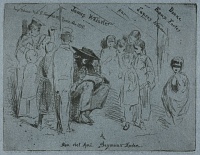Etchings Institutions search term: wunderlich
The Title Page for 'Douze Eaux Fortes d'après Nature' | ||
| Number: | 22 | |
| Date: | 1858 | |
| Medium: | etching | |
| Size: | 112 x 147 mm | |
| Signed: | no | |
| Inscribed: | 'Douze / Eaux Fortes / d'apres Nature - / par James. Whistler. / Imp. Delatre. Rue St. Jacques. 171. Paris. Nov. 1858 -' and 'Imp. Delatre. Rue St. Jacques. 171. Paris. Nov. 1858 -' at top; 'A / Mon viel Ami Seymour Haden.' at bottom. | |
| Set/Publication: | 'French Set', 1858 | |
| No. of States: | 1 | |
| Known impressions: | 56 | |
| Catalogues: | K.25; M.25; T.1; W.20 | |
| Impressions taken from this plate (56) | ||
TECHNIQUE

r.: Succès d'Erneste à Cologne; v.: Tracing of recto [m0271].
Freer Gallery of Art.
The drawing, Succès d'Erneste à Cologne, reproduced above, was used to trace the design onto the copper plate. 14 The verso of the drawing, showing the faint traced lines, is reproduced below.

Thus although the portrait was drawn from life, it was not drawn with an etching needle directly onto the plate, but traced and etched back in the studio.
In the etching, the artist is defined roughly, with the textures of clothes emphasized by foul biting, and cross-hatching enriching the shadows. The children are drawn much more briefly. The inscription includes the words 'd'apres Nature' ('from Nature'), which clearly defines the direction of Whistler's work, with a new emphasis on realism and working on site. The title page was dedicated to Francis Seymour Haden, Sr (1818-1910), who had encouraged Whistler to work 'from nature'.
14: MacDonald 1995 (cat. nos. 270-271).
After the 'French Set' was first published, Whistler spent Christmas 1858-1859 in London, and the two brothers-in-law were instructed in the art of printing by Auguste Delâtre (1822-1907). On his return to Paris Whistler left some of the copper plates with Haden. He wrote to his sister:
'I'm working hard and my stay in London with you and Seymour has done me an immense good in "my art" - ... I have prepared sketches for two pictures and have drawn one of them in on the canvass [sic], all from Nature tell Seymour - ...
My etchings have been very much admired, and I wish Seymour would send me three fine proofs of each in black ink.
' 15
15: Whistler to D. Haden, [12/30 January 1859], GUW #01913.
PRINTING
Over fifty impressions are known. According to Edward Guthrie Kennedy (1849-1932):
'The impression of the few earlier sets printed, are, generally, on a thin, yellowish China paper, mounted on light white plate paper. The plate mark is a trifle outside the yellow paper and sometimes does not show clearly. This subject was also printed on the original paper wrappers of the set.' 16
16: Kennedy 1910 (cat. no. 25).
Many impressions are indeed in black ink on thin Japanese paper (which varies between cream, buff and ivory in colour) and laid down, usually on off-white wove card-like paper ( ,
,  ). A few are in brown ink on laid paper (
). A few are in brown ink on laid paper ( ,
,  ). Finally, several are on wove paper (
). Finally, several are on wove paper ( ,
,
 ), and a number of striking examples, including one that stayed in Whistler's possession, are on a dark blue fibrous wove paper - sometimes fading to brownish-blue (
), and a number of striking examples, including one that stayed in Whistler's possession, are on a dark blue fibrous wove paper - sometimes fading to brownish-blue ( ,
,
 ,
,  ,
,  ,
,  ).
).
 ,
,  ). A few are in brown ink on laid paper (
). A few are in brown ink on laid paper ( ,
,  ). Finally, several are on wove paper (
). Finally, several are on wove paper ( ,
,
 ), and a number of striking examples, including one that stayed in Whistler's possession, are on a dark blue fibrous wove paper - sometimes fading to brownish-blue (
), and a number of striking examples, including one that stayed in Whistler's possession, are on a dark blue fibrous wove paper - sometimes fading to brownish-blue ( ,
,
 ,
,  ,
,  ,
,  ).
).The only other example of Whistler's etchings to be printed occasionally on blue paper was the nocturne, Street at Saverne
[14], and it was done in a different manner, using blue Japanese paper laid down on off-white (see  ,
,  ). Both etchings certainly made a dramatic contrast to the rest of the 'French Set'.
). Both etchings certainly made a dramatic contrast to the rest of the 'French Set'.
 ,
,  ). Both etchings certainly made a dramatic contrast to the rest of the 'French Set'.
). Both etchings certainly made a dramatic contrast to the rest of the 'French Set'.
